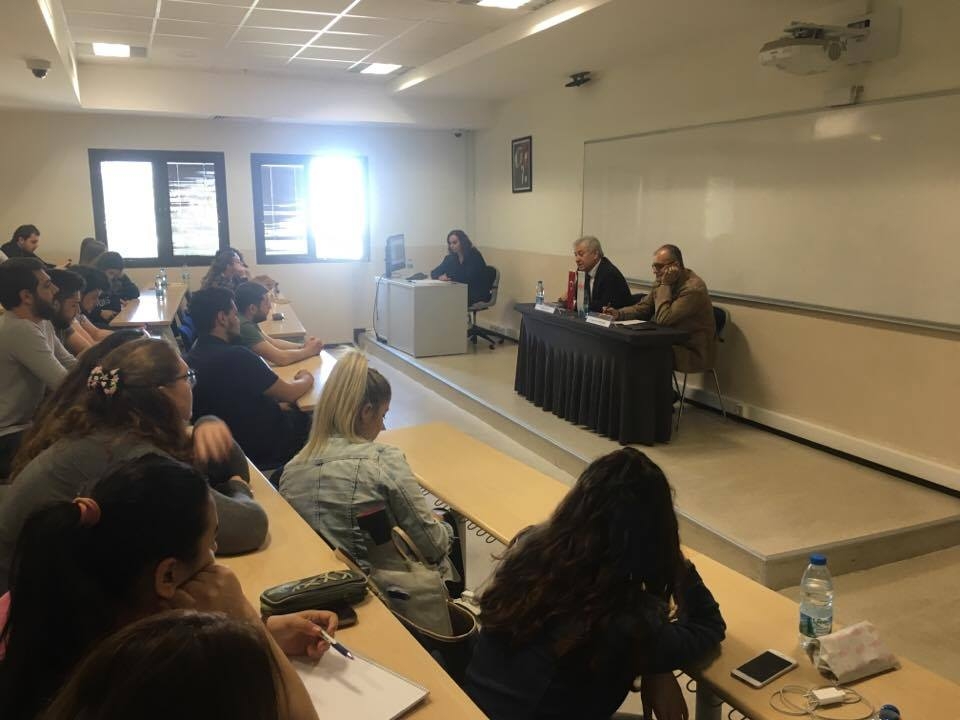
...
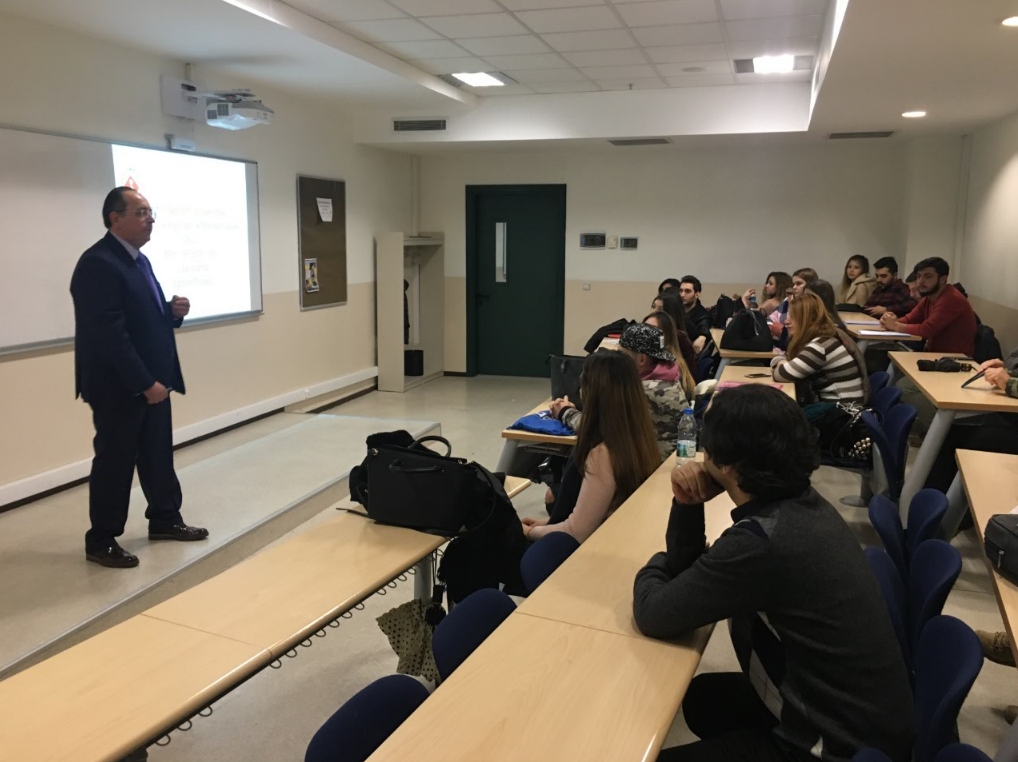
...
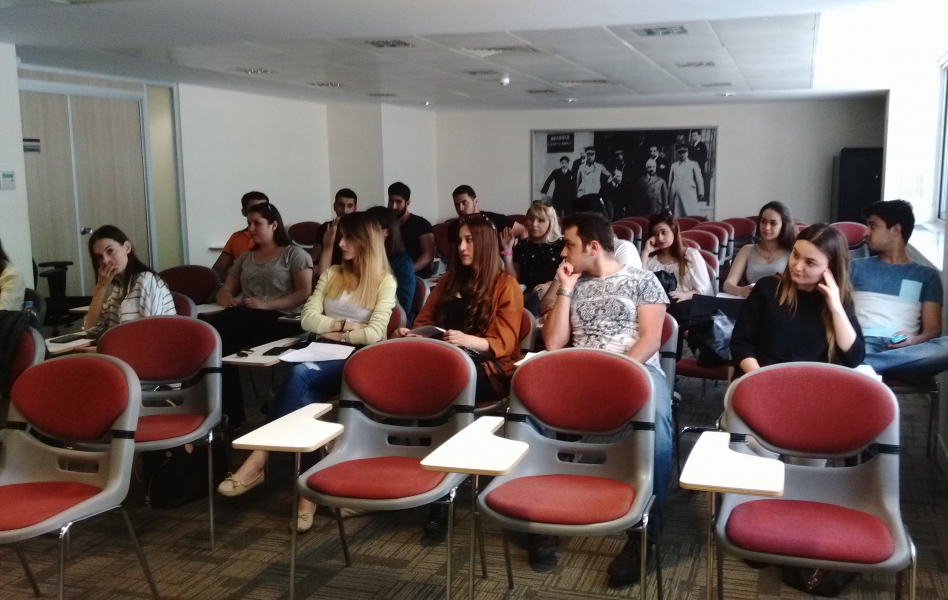
...
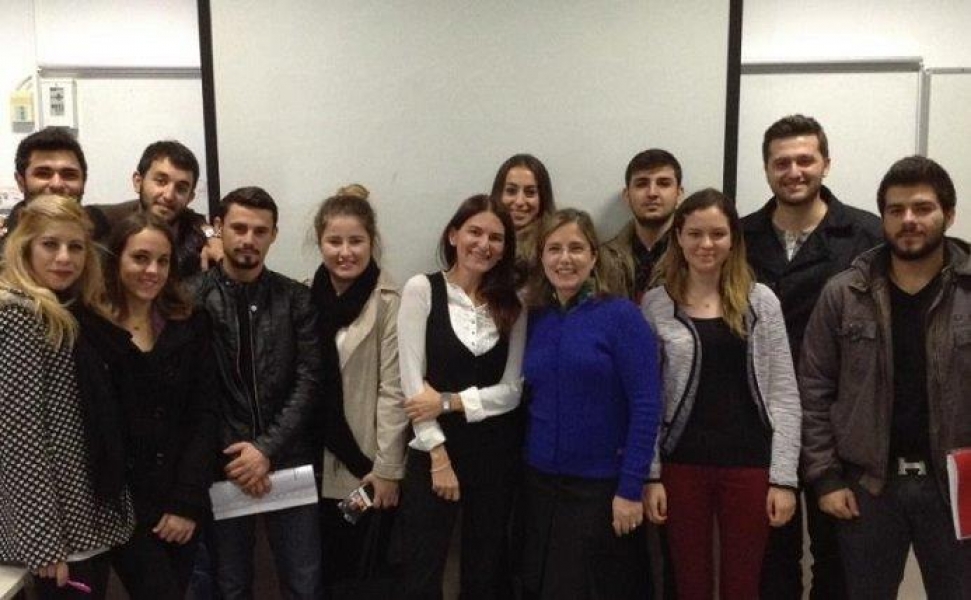
...
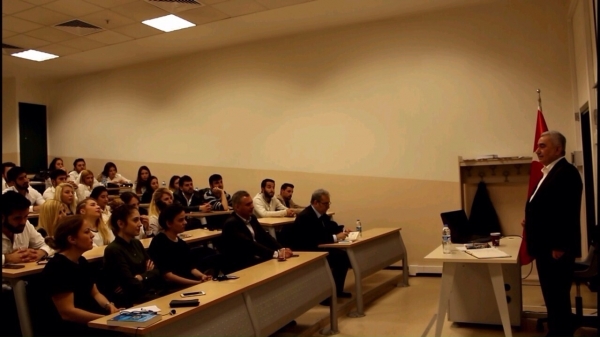
...

...
| Course Name |
Business Administration II
|
|
Code
|
Semester
|
Theory
(hour/week) |
Application/Lab
(hour/week) |
Local Credits
|
ECTS
|
|
MISL 102
|
Fall/Spring
|
3
|
0
|
3
|
5
|
| Prerequisites |
None
|
|||||
| Course Language |
Turkish
|
|||||
| Course Type |
Elective
|
|||||
| Course Level |
Short Cycle
|
|||||
| Mode of Delivery | - | |||||
| Teaching Methods and Techniques of the Course | DiscussionGroup WorkCase StudyLecture / Presentation | |||||
| National Occupation Classification | - | |||||
| Course Coordinator | - | |||||
| Course Lecturer(s) | ||||||
| Assistant(s) | - | |||||
| Course Objectives | This course aims to provide students with a general view on the currents issues in business functions (production, marketing, management and finance). |
| Learning Outcomes |
The students who succeeded in this course;
|
| Course Description | Business Administration II is a basic course that gives students the changing concepts of businesses, their functions in the developing world and the world economy. It is the continuation of Business Administration I and aims to teach the students the current changes in business functions. |
| Related Sustainable Development Goals |
|
|
Core Courses | |
| Major Area Courses | ||
| Supportive Courses | ||
| Media and Management Skills Courses | ||
| Transferable Skill Courses |
| Week | Subjects | Related Preparation |
| 1 | Informing about the operation of the course, reminding the basic business concepts | Informing about the operation of the course, reminding the basic business concepts |
| 2 | Current issues in business and management from past to present | Tamer Koçel, “İşletme Yöneticiliği”, 12. Baskı,2010, s. 209-458. |
| 3 | Current issues in businesses: the concept of "consumerism" and the new consumer | -Yolaç, G. (2011). Consumerism. Öneri Dergisi, 9(35), 159-162. https://dergipark.org.tr/tr/download/article-file/165767 -Altuntuğ, N. (2010). Geleneksel Tüketim Olgusunun Kirilma Noktasi: Yeni Bir Tüketim Paradigmasina Ve Tüketici Kimliğine Doğru . Organizasyon ve Yönetim Bilimleri Dergisi, 2(2), 111-118. https://dergipark.org.tr/en/pub/oybd/issue/16336/171034 |
| 4 | Current issues in marketing: consumer culture theory | -Albayrak, T. & Aksoy, Ş. (2008). Tüketici Davranişinda Temel Yaklaşimlar. Pazarlama Araştırmaları Dergisi, 2(3), 1-19 -Eric J. Arnould, Craig J. Thompson (2005). Consumer Culture Theory (CCT): Twenty Years of Research, Journal of Consumer Research, 31(4), 868-882. https://doi.org/10.1086/426626. |
| 5 | Human resource management in modern business | Hüseyin Özgen ve Azmi Yalçın “İnsan Kaynakları Yönetimi Stratejik Bir Yaklaşım” Nobel Yayınevi. |
| 6 | Ecological and sustainable approaches in business | Yavuz, V. A. (2014). Sürdürülebilirlik Kavramı Ve İşletmeler Açısından Sürdürülebilir Üretim Stratejileri/Concept of Sustainability and Sustainable Production Strategies for Business Practices. Mustafa Kemal Üniversitesi SBE Dergisi, 7(14), 63-86. https://dergipark.org.tr/en/pub/mkusbed/issue/19556/208640 |
| 7 | Diversity Management | -Sürgevil, O. (2008). Farkllılık Kavramına Ve Farklılıkların Yönetimine Temel Oluşturan Sosyo-psikolojik Kuramlar Ve Yaklaşımlar. Balıkesir Üniversitesi SBE Dergisi, 11(20), 111-124 https://dergipark.org.tr/en/pub/baunsobed/issue/50241/648155 -Keil, M., Amershi, B., Holmes, S., Jablonski, H., Lüthi, E., Matoba, K., & Von Unruh, K. (2007). Farklılıkların yönetimi için eğitim elkitabı. Uluslararası Farklılıkların Yönetimi Derneği. |
| 8 | Midterm | |
| 9 | Digitization and Digital Media in Business | Klein, M. (2020). İşletmelerde Dijital Dönüşüm Ve Etmenleri. Journal Of Business in The Digital Age, 3(1), 24-35. DOI: 10.46238/jobda.729499 |
| 10 | Social Media and Creativity in social media | Erdem, B. Sosyal Medya Pazarlamasi. Pazarlamada Güncel Yaklaşımlar, Eğitim yayınevi. |
| 11 | Presentations | |
| 12 | Presentations | |
| 13 | Presentations | |
| 14 | Presentations | |
| 15 | Presentations | - |
| 16 | Final |
| Course Notes/Textbooks | Ders Kitabı Mucuk, İ. (2018). Modern İşletmecilik. Türkmen Kitabevi. ISBN: 9786054749300. Tamer Koçel, “İşletme Yöneticiliği”, 12. Baskı,2010, s. 209-458. ISBN: 9786052425817. Çetin, C. & Arslan M. L. (2017). Temel İşletmecilik. Beta Yayıncılık. ISBN: 9786052424575. |
| Suggested Readings/Materials | Aksoy, S. (2017). Değişen teknolojiler ve endüstri 4.0: Endüstri 4.0’ı anlamaya dair bir giriş. SAV Katkı, 4, 34–44. Avunduk, H. & Aşan, H. (2018). Blok zinciri teknolojisi ve işletme uygulamaları: Genel bir değerlendirme. Dokuz Eylül Üniversitesi İktisadi ve İdari Bilimler Fakültesi Dergisi, 33(1), 369–384. Aydın, I. (2017). Yönetimde kuşak farklılıkları, birlikte çalışma ve kuşakların yönetimi. Ankara Üniversitesi Eğitim Bilimleri Dergisi, 221, 69–94. Betil, İ. (2007). Ekonomik ve sosyal alanda girişimcilik. Girişimcilik ve Kalkınma Dergisi, 2(2), 21–24. Bulut, E. & Akçacı, T. (2017). Endüstri 4.0 ve inovasyon göstergeleri kapsamında Türkiye analizi. ASSAM Uluslararası Hakemli Dergi, 7, 50–72. Çetindamar, D., Tutal, E., Titiz, S. & Taluk, Ş. (2010). Sosyal dönüşümün ajansları: Sosyal girişimciler. Uluslararası Sosyal Girişimciler Konferansı. Demirtaş, B. & Argan, M. (2015). Büyük veri ve pazarlamadaki dönüşüm: Kuramsal bir yaklaşım. Pazarlama ve Pazarlama Araştırmaları Dergisi, 15, 1–21. Fırat, O. Z. & Fırat, S. Ü. (2017). Endüstri 4.0 yolculuğunda trendler ve robotlar. Istanbul University Journal of the School of Business, 46(2), 211–223. Gökalp, M. O., Kayabay, K., Çoban, S., Yandık, Y. B. & Eren, P. E. (2018). Büyük veri çağında işletmelerde veri bilimi. 5th International Management Information Systems Conference, 94–97. Kacar, A. İ. & Yakın, V. (2018). Paylaşım ekonomisi ve değer yaratmak: Kanvas iş modeli örneği. Üçüncü Sektör Sosyal Ekonomi, 53(3), 724–739. Kaplan, B. (2013). C kuşağı tüketici davranışları ve C kuşağına yönelik pazarlama stratejileri. 18. Ulusal Pazarlama Kongresi Bildiri Kitabı. Kiracı, H. & Kayabaşı, A. (2017). Yeni nesil bir ekonomik sistemin ülkemizdeki potansiyeli: Paylaşım ekonomisindeki iş modeli örneklerinin irdelenmesi. Uluslararası Afro-Avrasya Araştırmaları Dergisi, 4(2), 75–90. Köroğlu, Y. (2017). Yapay zekanın teorik ve pratik sınırları. 6. Evrim, Bilim, ve Eğitim Sempozyumu. Kuşat, N. (2012). Sürdürülebilir işletmeler için kurumsal sürdürülebilirlik ve içsel unsurlar. AKÜ İİBF Dergisi, 12(2), 227–242. Küçükkurt, A. (2018). Helal olsun!.. Para, 51, 10–18. Sarıkaya, M. & Kara, Z. (2007). Sürdürülebilir kalkınmada işletmenin rolü: Kurumsal vatandaşlık. Yönetim ve Ekonomi, 14(2), 221–233. Torlak, Ö. (2012). İslam ülkeleri arasında helal ürün pazarlama potansiyeli, problemleri ve çözüm önerileri. Tüketici ve Tüketim Araştırmaları, 4(2), 1–9. Turan, Z. (2018). Kripto paralar, bitcoin, blockchain, petro gold, dijital para ve kullanım alanları. Academic Review of Economics and Administrative Sciences, 11(3), 1–5. Ünay, S. & Dilek, Ş. (2018). Yeni korumacılık ve ticaret savaşları. Analiz, 228, 7–25. Yılmaz, M. & Divani, E. (2018). Ticaret savaşları, ekonomik milliyetçilik, yeni merkantilizm ve Dünya Ticaret Örgütünün işlevsizliği. İKÇÜ İİBF Dergisi, 1(1), 10–24. |
| Semester Activities | Number | Weigthing |
| Participation |
1
|
10
|
| Laboratory / Application | ||
| Field Work | ||
| Quizzes / Studio Critiques |
1
|
20
|
| Portfolio | ||
| Homework / Assignments | ||
| Presentation / Jury | ||
| Project | ||
| Seminar / Workshop | ||
| Oral Exams | ||
| Midterm |
1
|
30
|
| Final Exam |
1
|
40
|
| Total |
| Weighting of Semester Activities on the Final Grade |
3
|
60
|
| Weighting of End-of-Semester Activities on the Final Grade |
1
|
40
|
| Total |
| Semester Activities | Number | Duration (Hours) | Workload |
|---|---|---|---|
| Theoretical Course Hours (Including exam week: 16 x total hours) |
16
|
3
|
48
|
| Laboratory / Application Hours (Including exam week: '.16.' x total hours) |
16
|
0
|
|
| Study Hours Out of Class |
14
|
2
|
28
|
| Field Work |
0
|
||
| Quizzes / Studio Critiques |
1
|
10
|
10
|
| Portfolio |
0
|
||
| Homework / Assignments |
0
|
||
| Presentation / Jury |
0
|
||
| Project |
0
|
||
| Seminar / Workshop |
0
|
||
| Oral Exam |
0
|
||
| Midterms |
1
|
24
|
24
|
| Final Exam |
1
|
38
|
38
|
| Total |
148
|
|
#
|
Program Competencies/Outcomes |
* Contribution Level
|
|||||
|
1
|
2
|
3
|
4
|
5
|
|||
| 1 |
To be able to develop themselves in the subjects of obtaining the financial resources necessary for the activities of individuals and enterprises under the most favorable conditions and examining the use of the accumulated funds. |
-
|
-
|
-
|
-
|
-
|
|
| 2 |
To be able to discuss the role, importance and functions of the institutions providing banking and insurance services in the economic system |
-
|
-
|
-
|
-
|
-
|
|
| 3 |
To be able to evaluate the organizational structure, business processes, and service portfolios of banks, insurance companies, and other financial institutions operating in the sector. |
-
|
-
|
-
|
-
|
-
|
|
| 4 |
To be able to develop skills in identifying, measuring, and assessing financial and operational risks, and to acquire fundamental knowledge to understand and apply insurance products against these risks. |
-
|
-
|
-
|
-
|
-
|
|
| 5 |
To be able to recognize financial products offered in the banking and insurance sector, and to gain skills in effective marketing and sales, as well as managing long-term customer relationships. |
-
|
-
|
-
|
-
|
-
|
|
| 6 |
To be able to possess basic legal knowledge and closely monitor legislative changes relevant to the field. |
-
|
-
|
-
|
-
|
-
|
|
| 7 |
To be able to possess basic knowledge of accounting and analyze financial statements to evaluate the financial status of businesses. |
-
|
-
|
-
|
-
|
-
|
|
| 8 |
To be able to follow technological innovations in the financial sector and acquire knowledge about the role of blockchain and artificial intelligence applications in the industry. |
-
|
-
|
-
|
-
|
-
|
|
| 9 |
To be able to make decisions based on the principles of professional ethics, accountability and responsibility |
-
|
-
|
X
|
-
|
-
|
|
| 10 |
To be able to follow international financial markets and global economic indicators by using English at least at the A2 level of the "European Language Portfolio" |
-
|
-
|
-
|
-
|
-
|
|
| 11 |
To be able to analyze and interpret banking and insurance data, and to develop data-driven strategies for financial decision-making. |
-
|
-
|
-
|
-
|
X
|
|
| 12 |
To be able to acquire knowledge about the components of national and international systems and the implementation of sector policies. |
-
|
-
|
-
|
-
|
-
|
|
| 13 |
To be able to direct his/her education to a further level of education |
-
|
-
|
-
|
-
|
-
|
|
*1 Lowest, 2 Low, 3 Average, 4 High, 5 Highest

...

...

...

...

...

...

As Izmir University of Economics transforms into a world-class university, it also raises successful young people with global competence.
More..Izmir University of Economics produces qualified knowledge and competent technologies.
More..Izmir University of Economics sees producing social benefit as its reason for existence.
More..